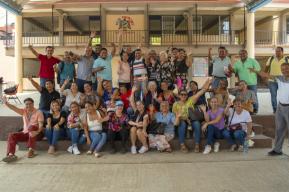News
Building inclusive urban futures: UNESCO and NIUA spotlight event explores data for people with disabilities

Both India and Indonesia are among these nations, with 34% and 57% of their populations already residing in urban areas in 2021 according to United Nations Department of Economic and Social Affairs. By 2050, India is projected to have an astounding 600 million urban dwellers, while Indonesia is set to reach 285 million. This urban revolution, driven by economic growth and rural-to-urban migration, presents both challenges and opportunities for sustainable development in these dynamic countries.
Against the backdrop of rapid urbanization the United Nations Educational, Scientific and Cultural Organization (UNESCO) and National Institute of Urban Affairs (NIUA) co-convened the U20 Mayoral Summit Spotlight Event, titled "Making Data Work for People" on 8 July 2023, bringing together policymakers, experts, and stakeholders to prioritize the inclusion of persons with disabilities (PwDs) in urban development through the effective use of data. The event aimed to address the social and economic disparities faced by marginalized groups, particularly the urban poor and persons with disabilities. The unsystematic growth of cities has often overlooked the specific needs of these communities, leading to exclusion and limited access to essential services and opportunities.
On this occasion Making Data Work for Persons with Disabilities’: Project Localization & Implementation Report for GUIDE was launched with Mr Hitesh Vaidya, Director, NIUA, Ms. Eunsong Kim, UNESCO, Mr H. Ibnu Sina, Mayor of Banjarmasin, and Mr Chand Kaushil, Head, ICT Innovations and Solutions, United Nations. The GUIDE initiative was developed to identify methods and a roadmap for collecting evidence necessary for efficient service delivery to marginalized groups, especially persons with disabilities, in a participatory manner. The project, piloted in Varanasi, presents sector-wise analysis to identify gaps in service delivery and key policy recommendations across 8 priority sectors – education, livelihood, health and hygiene, transportation and mobility, assistive technology, recreation and tourism, financial services, and housing.
The event highlighted the crucial role of citizen-centric data in designing disabled-friendly cities of the future. Panelists engaged in informative discussions, shared best practices and explored innovative approaches to harness the power of data for promoting inclusion. The overarching objective was to ensure that no one is left behind, in line with the principles of disability inclusion.
The event also emphasized the vital role of the private sector in the data ecosystem, particularly in promoting social protection and welfare. Private sector representatives highlighted their investment in citizen-centric data collection technologies, partnerships with local governments and civil society organizations, and measures to safeguard data privacy.
Esteemed panelists, including the Mr H. Ibnu Sina, Mayor of Banjarmasin, Mr Ashutosh Chadha, Director and Country Head of Public Policy and Government Affairs at Microsoft Corporation India, Ms Li Stephanie Choo, Social Affairs Officer at the UN ESCAP Subregional Office for South and South-West Asia, Mr Fuad Jamil, Senior Facilitator at Kota Kita Foundation, and Mr Gaurav Raheja, Professor and Head of Architecture & Planning at the Indian Institute of Technology (IIT), Roorkee, shared insights and experiences, addressing key questions such as the role of data in optimizing the delivery of basic services in cities, approaches to participatory urban governance, creating efficient data pipelines for evidence-based policies, and the role of the private sector in driving inclusive urban development.
Mr Ashutosh emphasized the role of the private sector to work as “both an interlocutor and as a implementer of solutions” in the inclusive urban development ecosystem to ensure solutions are “affordable, available, accessible, applicable in the scenario in their circumstances”.
The spotlight event successfully raised awareness about the significance of data-driven approaches in promoting the inclusion of persons with disabilities in urban development. By leveraging data and engaging in collaborative efforts, policymakers, practitioners, and the private sector can drive positive change and create disabled-friendly cities that cater to the diverse needs of all citizens.
Professor Gaurav cautioned that although “we have started to think data equals people and people means data […] Data cannot be taken as people.” He further noted that human-centric data is essential to people-centric urban development.
The U20 Mayoral Summit's Making Data Work for People event served as a crucial platform for knowledge exchange, networking, and the formulation of concrete actions to foster data-driven inclusion and transform urban landscapes into truly inclusive environments for persons with disabilities.








